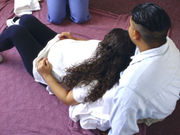Improvement noted in women’s childbirth-related appraisals and psychological functioning
WEDNESDAY, May 31, 2017 (HealthDay News) — Participation in a mindfulness-based childbirth preparation course, the Mind in Labor (MIL), is associated with improvement in women’s childbirth-related appraisals and psychological functioning, according to a study published online May 12 in BMC Pregnancy and Childbirth.
Larissa G. Duncan, Ph.D., from the University of Wisconsin-Madison, and colleagues conducted a randomized controlled trial (RCT) involving 30 first-time mothers in the late third trimester. Participants were randomized to attend either a short, time-intensive, 2.5-day mindfulness-based childbirth preparation course offered as a weekend workshop (MIL: Working With Pain in Childbirth, which was based on Mindfulness-Based Childbirth and Parenting education) or a standard childbirth preparation course with no mind-body focus.
The researchers found that, compared with standard childbirth education, mindfulness-based childbirth education correlated with improvement in women’s childbirth-related appraisals and psychological functioning. Greater childbirth self-efficacy and mindful body awareness were seen for MIL program participants, but there were no changes in dispositional mindfulness. MIL program participants also had lower post-course depression symptoms that persisted through postpartum follow-up, and a trend toward a lower rate of opioid analgesia use in labor. Compared with controls, participants did not report lower perceived labor pain or less frequent epidural use.
“A large-scale RCT that captures real-time pain perceptions during labor and length of labor is warranted to provide a more definitive test of these effects,” the authors write.
One author disclosed receiving royalties from the sale of her book, related audio materials, and an app on the topic of the intervention tested in this study.
Copyright © 2017 HealthDay. All rights reserved.








